
| Pendle.Net -> News -> Internet (Latest) -> Internet: 12Jan1999 |
Internet Story: 12 Jan 1999
 |
|
 |
Disney is all GO!
Last night saw the launch of the latest portal site, GO
Network, a partnership between Disney and Infoseek (my least favorite search engine!).
Just as everyone is groaning about the fact that all major players seem to be
jumping on the "portal" bandwagon, along comes another. The idea is to
attract the combined 20 million visitors that visit Disney
and Infoseek's existing sites. Combining Disney and Infoseek properties, Go offers communities of like-minded users, chat rooms, free email, and home page builders. "Creeping personalization"--a term used by Infoseek chief executive Harry Motro last week at the Consumer Electronics Show--enables all other sites on the Go Network to recognize the user's choices on any given site. The network approach reflects a trend among Web properties, which are turning away from a strategy of simple feature aggregation on one mega-site in favor of presenting original material via familiar media brands intended to attract Web surfers and TV viewers alike. The new breed of sites have been dubbed "destination" sites. This is something along the lines of what we have envisaged for Pendle.Net for over a year now - just wish we had the money that Disney has! ;-) |
|||||||||||
Current Portals:
|
|
UK Use to Rocket According to a report released on Monday 43% of adults surveyed expect to be online by the end of this year. At the moment the figure stands at about 29%. The growth of the Internet at home and work is faster than any technology that we have seen previously, like TV, Video Recorders, and CDs. The current breakdown is 14% at home (about half of the level of uptake in the US, and 2/3 of what the uptake is like in Scandinavian countries.) 18% of men and 11% of women said that they access the Internet from home. Between 23% and 25% of people in the North of England are online. The main thing putting people off going online appears to be the extortionate telecoms charges levied in the UK. Nevertheless, the poll, carried out for the Guardian newspaper, showed that expansion should be more than double last year's rate of 1% every two months. For more details (including regional breakdown) see the BBC article.
 |
What have Yahoo!'s Lawyers been smoking? Lawyers for the giant portal and directory of the Internet Yahoo!, are not saying, "Peace man". They're up in arms about what they see as a dilution of their trademark by the site YaHooka!, a site dedicated to information about marijuana. Last Friday (9th January) YaHooka! was issued with a cease & desist letter from Yahoo!'s counsel - they have until the 13th of January to shut down (and the domain names turned over to Yahoo!) before further action is taken. |
| The site, which draws 1,000 users a day, has caught on among the global
cannabis community. The YaHooka index, updated daily, presents a range of
weed-friendly URLs: from the bare-bones The Art of Making Bongs, to the online
headquarters of the legally beleaguered Cannabis Cafe in British Columbia ("enjoy a
taste of freedom"), to an impressive
compendium of legalization resources from Norway to South Australia. YaHooka claim that they are not infringing anything, they point out that many other sites have either parodied or have similar names to Yahoo! without being served with legal action. The site is full of useful information, although we warn you, it does takes a pro-use stance. |
|
Software Unacceptably Full of Bugs! For the first time since 1994, the editors of BugNet have decided NOT to present an Annual Award for the year's best bug fix performance. Why? Because all manufacturers have shown an "abysmal" performance in fixing things! "The average American would never buy an electric razor, let alone a chain saw or a mountain bike -- that was as buggy and unreliable as a PC," according to Bruce Brown, the website's editor. A sentiment we Brits will probably agree with!
Chief Customer Officer A new job title is being created in major corporations to deal with a byproduct of the electronic commerce revolution: the chief customer officer. So says latest research by Meta Group. "With markets approaching saturation and product and service offerings becoming more indistinguishable, the difference between winners and losers in the early 21st century will be customer relationship management," said Dale Kutnick, Meta's chief executive officer. "We believe that is the way companies will be judged in the future." Companies have begun appointing a single executive to oversee the efforts, and they are budgeting millions of dollars to install Internet-based customer relationship management (CRM) systems. Meta forecasts that by the year 2000, 35 percent of customer contact will be via nontraditional, electronic means.
0.2% Good Customer Service It's probably about time that positions like the above mentioned CCO are implemented in companies wishing to take up the e-commerce challenge. According to an article in the NY Times today, customer service is not very good on e-commerce sites. Part of the solution, according to Jakob Nielsen (guru of usability), is obviously to give better service, the other is to design more usable web sites. Part of the problem with web sites, and technology in general, is that it is usually designed by technologists for technologists. The general mass user rarely ever gets considered. We need to be designing our sites so that as many users as possible find them, er, well, usable. See Jakob's excellent site for a goldmine of information on web site design for usability.
UK E-commerce starts
According to a recent BBC
article, "Of the UK's 100 largest retailers, 47 have web sites but only 14 of
these can be used to buy goods." Scary! Watch out for the US invasion!
However, it is predicted that within five years more than £6bn worth of goods in
the UK will be sold over the computer network, representing 2.5% of total retail sales.
Electronic shopping sales in the UK were £406m in 1998, or 0.2% of retail sales,
according to Verdict, and that figure is set to double in 1999. And back to service... A large drop in the number of 15-24 year olds shopping on the
Internet in 1998 put down to disappointment with the service! Come on guys, get with
the program!
Do Headteachers have a problem? According to a report released by BT today, they do. The problem seems to be the resistance from their staff as they attempt to use information and communication technologies (ICT) to improve the quality of teaching and learning in schools. Other than the usual funding problems that our schools suffer, training and access to advice were cited as being the main concerns. The BT report (compiled by a group of teachers and headteachers, who were selected for their experience and expertise in the field of ICT in education) is available* to schools and attempts to guide them and advise on best ways forwards. "It is not enough simply to provide schools with computers and communication links," said Sir Peter Bonfield, Chief Executive of BT. "New technology makes new demands of teachers. They have to be equipped to make effective use of that technology in the classroom and to learn how to harness its potential."
* "Heading for the Superhighway" is available free of charge to schools and others with an interest in ICT in education from BT Education Services, PO Box 10, Wetherby, West Yorkshire, LS23 7EL or by calling 0800 622302. Unfortunately, BT, in their usual forward thinking way have not made it available online :-(
Andrew Stringer, © Pendle.Net Ltd, 1999